In Portland, a neighborhood watch group stirs debate over how to respond to the homeless

Neighborhood advocates or vigilantes? A group in Portland makes life tougher for the homeless
The Montavilla neighborhood is a place just about anybody might want to live in.
It has an âalmost suburbanâ feel, a city website notes, but itâs near downtown Portland, with a population thatâs more diverse than the city as a whole. Homes range from pricey modern to modest bungalow; businesses of every stripe do a bustling trade.
For the record
An earlier version of this article attributed one comment in a YouTube video to Benjamin Kerensa. He denies that it is his voice, and The Times was unable to independently confirm who was speaking. A previous version of the article also contained comments by homeless activist Ibrahim Mubarak blaming Montavilla Initiative members for slashing tents and throwing cold water on homeless people. Mubarak has since said that he cannot be certain that members of the group were responsible for those acts, and that he did not personally witness them. The article also characterized Montavilla Initiative as a conservative organization, which some members and observers dispute. It also misquoted Kerensa as advocating that homeless people overdose on heroin "if they wish." He did not specifically refer to the homeless and actually said "if they want."
Last year Montavilla made Lonely Planetâs list of the 10 best U.S. neighborhoods.
It also broke apart over homelessness and rising crime.
Like many American cities, Portland struggles with homelessness. Whatâs the solution to getting people off the streets? Whatâs the right balance between compassion and safety? Why does the worldâs richest country have so many people living in tents?
Last month, Portland-area voters funded $653 million for affordable housing, on top of $258 million in 2016. These are major investments for a city its size. But relief may be years away.
In Montavilla, the debate over homelessness has taken on an edge in the last two years.
In June 2017, the Montavilla Neighborhood Assn. passed a resolution asking the city to âcease further sweeps of [homeless] camps,â which could be âunconstitutional and human rights violations.â
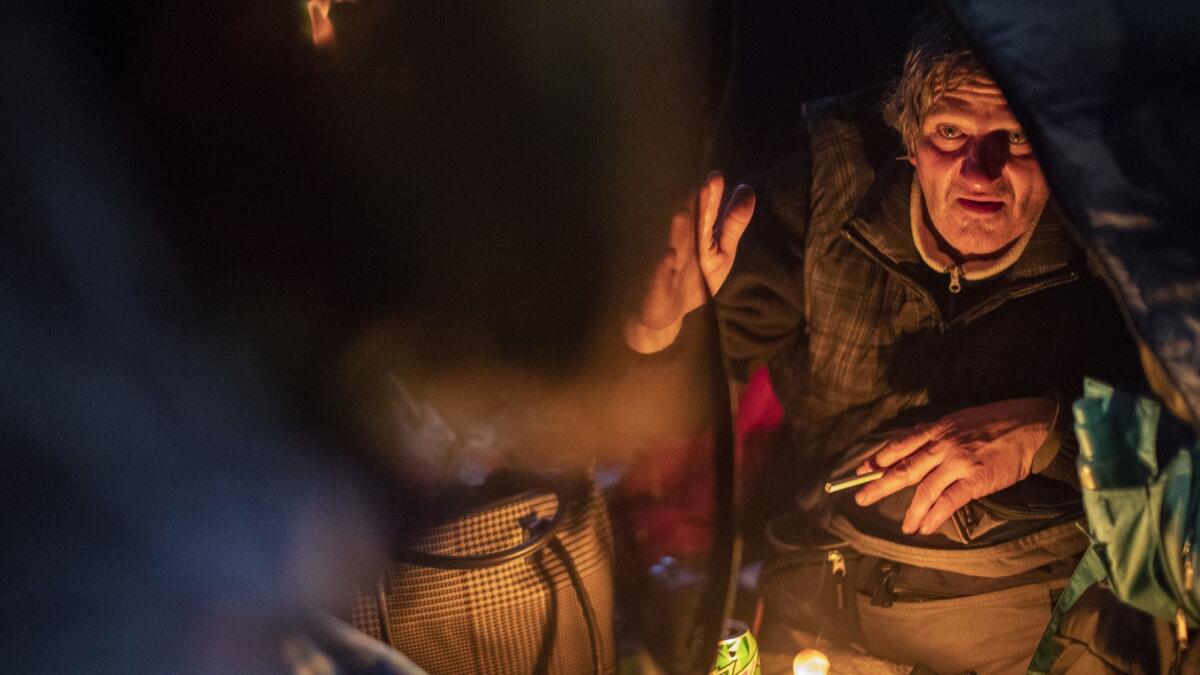
That fall, a new board of directors was voted in that included Micah Fletcher, a survivor of last yearâs infamous stabbings by a white supremacist on a light rail train. Around the same time, however, a new nonprofit, Montavilla Initiative, formed as an alternative, focused on public safety in the neighborhood. Battle lines hardened.
Montavilla Initiative began doing its own foot patrols, which others had done previously. Experts say similar groups have sprung up in other cities, including Long Beach and the west San Fernando Valley, as a conservative, tough-love response to the problem.
Interactions between citizen patrol groups led by Montavilla Initiative and the areaâs homeless are now at the center of the neighborhoodâs divide. On the one hand, local officials and homeless advocates accuse Montavilla Initiative of harassing vulnerable homeless people. On the other, leaders of the nonprofit say homeless encampments foster crime, and theyâre just trying to make the neighborhood safer.
Multnomah County official Kim Toevs said Montavilla Initiative members harassed people who use the countyâs largest needle exchange site, part of a program that has operated for 22 years in the neighborhood. It offers addiction counseling, exchanges millions of syringes annually, and gives out naloxone, proven to save lives by halting overdoses.
The county had to hire extra security after seven visits by the group, officials said. Among other things, they said, Montavilla Initiative members photographed clients of the needle exchange, some of whom feared being exposed on social media.
âWhat we see here, about [their] behavior, harassing our clients, and making them feel stalked and scared, is hateful action,â Toevs said.
Montavilla Initiative denies using violence or intimidation against homeless people.
Of 15 homeless people interviewed for this article, many said theyâre aware of what they call the âneighborhood watchers.â One voiced support, but most said they were afraid of them. None specifically accused Montavilla Initiative patrols of bad behavior, however, and they couldnât differentiate between the new patrols conducted by the nonprofit and those conducted by others.
âYou mean the ones that harass us?â said Amy Griffin, a homeless woman, when asked about foot patrols. She said people blow car horns âat all hoursâ and yell âGet out of here!â at her.
A man named Jerry, who wouldnât give his last name, said they were ârude and disrespectfulâ and left him âcoiled up inside.â Carlos Guzman said they threatened and cursed at his friend.
But a homeless woman who gave her name as Sky Smart expressed gratitude to Montaville Initiative for giving her woolen socks and leftover clam chowder. âHomeowners have a right to watch the neighborhood,â she said.
Police statistics show property crime has risen in the neighborhood in the last three years. In July, Portland Police Assn. President Daryl Turner called Portland a âcesspoolâ and criticized elected officials for their response to homelessness.
The uptick in crime has motivated Montavilla Initiative, some of whose members acknowledge they have no training in homeless outreach.
The patrols âhave been something weâve had to learn along the way,â said group member Jeff Church. âThe intention is to treat people with kindness. Sometimes that works, sometimes that doesnât.â
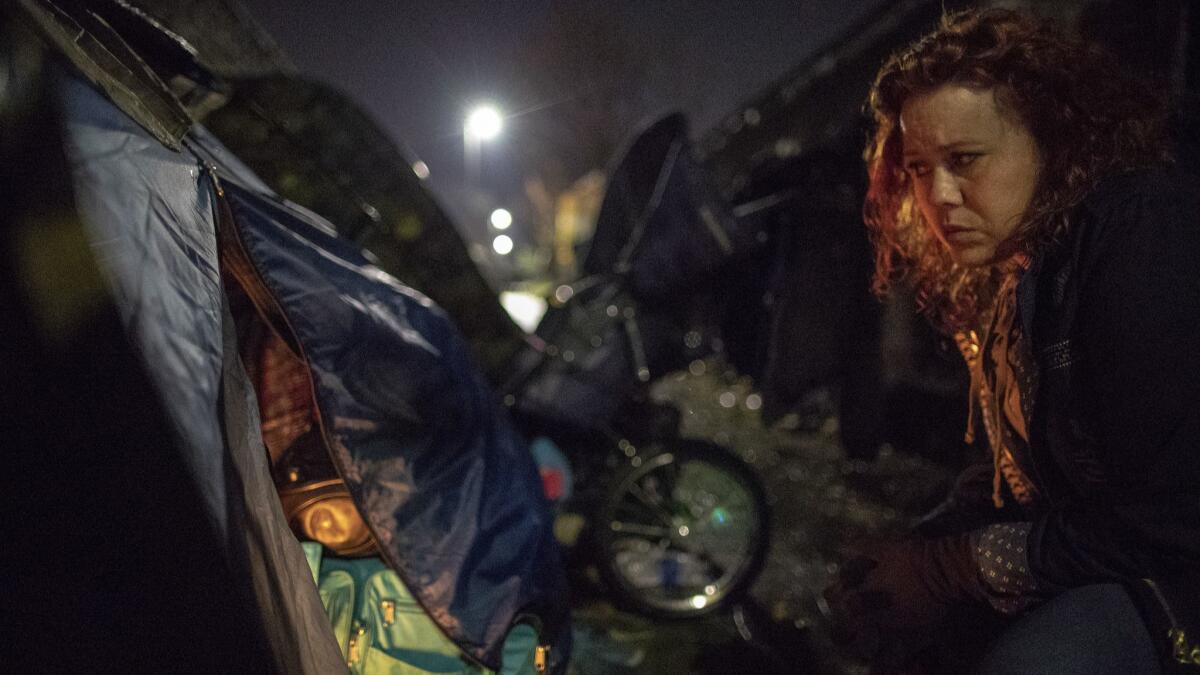
The groupâs leaders, including Angela Todd, Benjamin Kerensa, Evelyn Macpherson and Church, say the nonprofit has helped clean up Montavilla Park, including picking up discarded needles and less dangerous trash, and that its patrols increase safety. They say they scan for illegal behavior, not homelessness.
They also say they support local homeless people, and theyâve developed helpful relationships with some, such as Paul Rodriguez, who lives in his Corvette.
One Multnomah County worker, Kelsey Knavel, who is a program specialist at the needle exchange, said she had seen members of the group verbally harass people, but has never witnessed violence. âTheyâre very savvy; they havenât violated any laws,â she said.
On two evening patrols in late November, Rodriguez and others poked heads out of tents and vehicles to chat with Montavilla Initiative members. Todd hugged one woman and called another âsweetie.â Rodriguez, Kerensa and Macpherson chatted about âbad applesâ â troublemakers who ruin things for more peaceable homeless people.
Some interactions ended less amicably.
During one recent interaction with a trio of homeless people taking shelter in a church alcove, the group left after voices were raised in anger; two men seemed to have been upset by the surprise nighttime visit.
Neighbors want to âhave a presence,â Todd said, and shouldnât tolerate âmayhem,â including public urination, drug use, violent crime, people throwing rocks at cars or siphoning gas. A campaign by the nonprofit is called #enoughisenoughpdx. (PDX is Portlandâs airport designation.)
But the language on a closed Facebook group called âMontavilla Public Safetyâ offers a window into the animosity unleashed in the neighborhood.
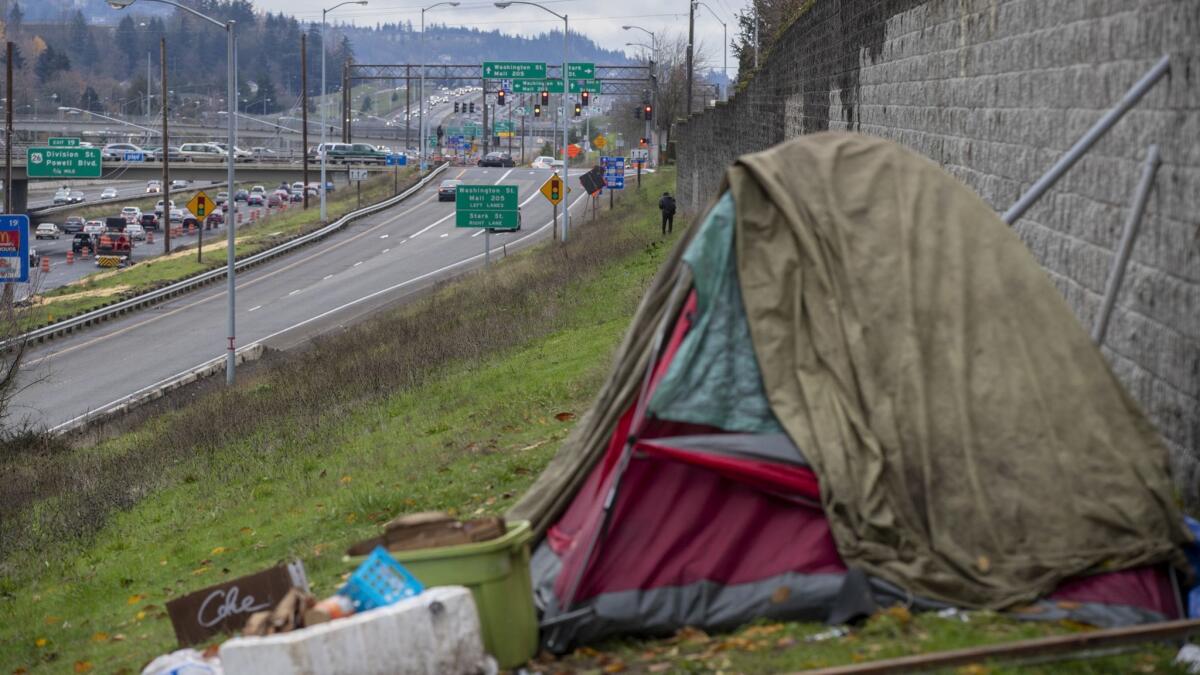
The site declined to give two Timesâ reporters access, but screenshots shared by an activist reflect vitriol and violence. Homeless people are called âzombies,â âterrorists,â âferals,â âleechesâ and âbarbarians.â Homelessness and criminality are conflated. Frustration and anger boil over. Names and locations of specific people are included.
âItâs clear, they will steal, rape, injure, murder us hard working citizens without a care in the world,â one participant writes.
One user writes he doesnât patrol âbecause I think I would not be able to abstain from cracking some skulls.â Kerensa, who founded the Facebook group and is a former leader of Montavilla Initiative, said that offensive posts in the group were quickly deleted and offenders were removed from the group. One screenshot of an exchange on the site, however, has Kerensa saying it would be good to âlegalize heroin and let them get the strongest stuff and dose themselves off if they want. Natural selection.â
Kerensa, who said he was once homeless himself, said he didnât recall using those words, but âif thatâs what it says, then Iâm gonna go ahead and own it.â
Users write of taking justice in their own hands, or using drones with video capability to observe local camps â something two homeless interviewees said does occur. Kerensa said drones had not been used to harass homeless people, although they might have flown over them.
Randy Teig, who worked for years with neighborhood stakeholders including Montavilla Initiative members as a police sergeant, said he had spoken to Kerensa and other members of the group about their behavior.
âI cautioned them about what theyâre doing. I said, âYouâre not police officers; donât go out there and start injecting yourselves into police business.ââ
Teig left the police in 2018, but said he knows the group well. He cautioned that online âgroupthink,â no matter the politics, can be dangerous.
âThereâs polarization in the community right now, no question,â he said. âPeople are frustrated, and frustrated people do stupid [stuff].â
Schmid is a special correspondent. Times staff writer Matt Pearce in Los Angeles contributed to this report.
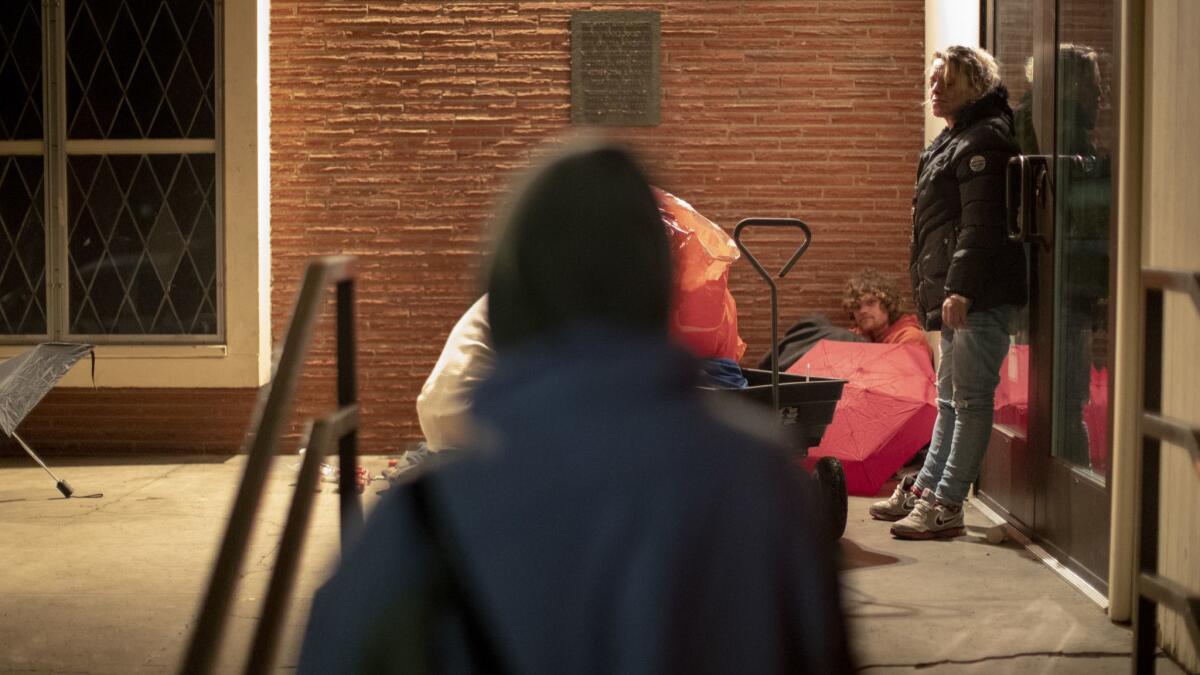
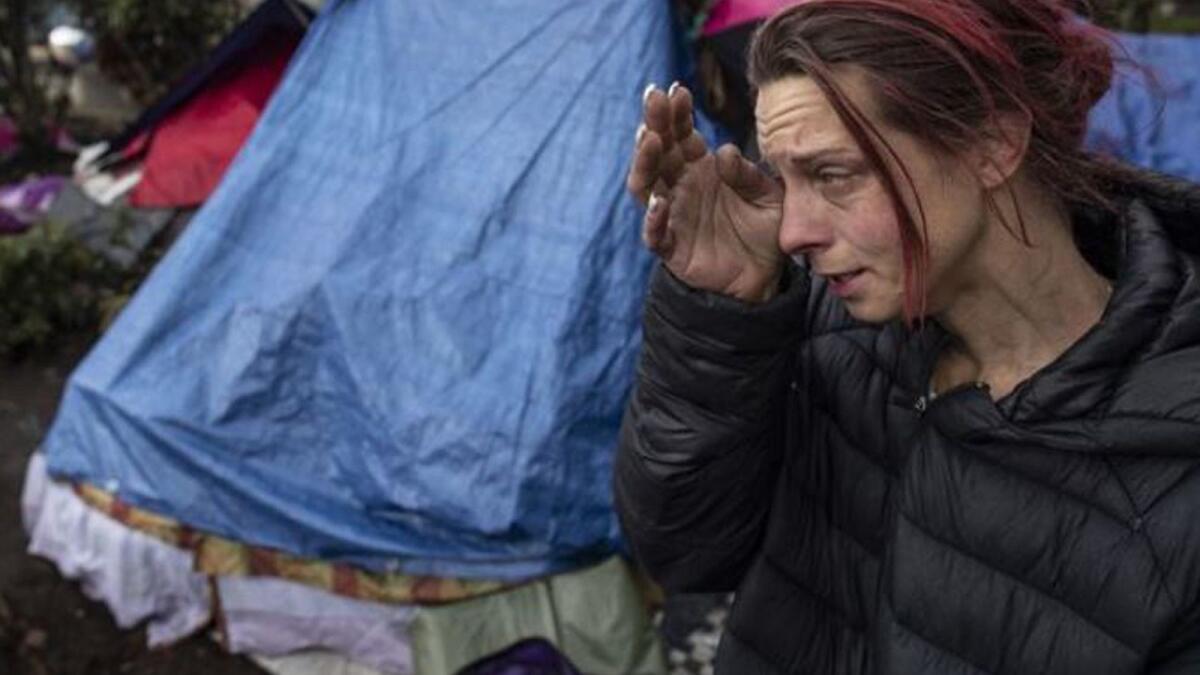
Sign up for Essential California
The most important California stories and recommendations in your inbox every morning.
You may occasionally receive promotional content from the Los Angeles Times.







